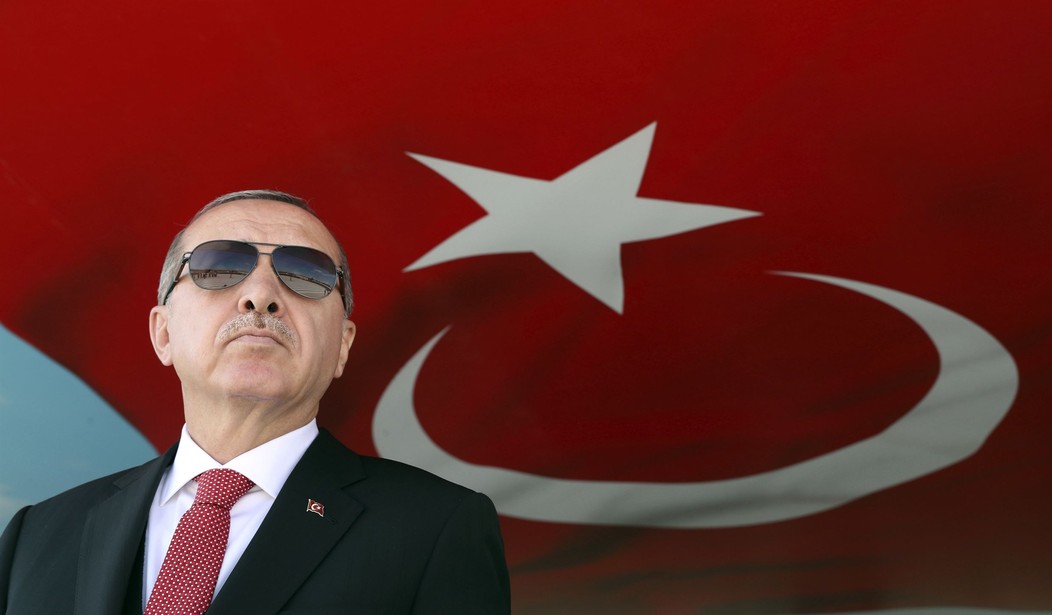Old Joe Biden’s congratulatory message to Turkish President Recep Tayyip Erdogan upon his highly questionable (hey, what election isn’t these days?) reelection was boilerplate from whoever writes his tweets, but nevertheless, it revealed yet again the growing gap between the world views of the two men. That gap has serious geopolitical implications that go all the way back to the anniversary that was observed on the day after the Turkish strongman’s reelection: May 29 marked 570 years since the fall of Constantinople to the Ottoman Turks and the extinguishing, after over two thousand years of continual existence, of the Roman Empire.
Biden’s Twitter wonk wrote on Sunday afternoon: “Congratulations to President Recep Tayyip Erdogan of Türkiye on his re-election. I look forward to continuing to work together as NATO Allies on bilateral issues and shared global challenges.” (Türkiye is what the nation of Turkey has renamed itself so as to minimize comparisons with a certain Thanksgiving bird. Yes, really.) Biden’s mouthpiece is blandly pleased about the prospect of the U.S. “continuing to work together as NATO Allies” with Erdogan’s Turkey, but Erdogan and his supporters have a very different set of priorities.
To celebrate Erdogan’s victory, his followers gathered in Istanbul’s Hagia Sophia mosque and screamed “Allahu akbar,” which does not mean “God is great,” as the Western establishment media routinely claims, but rather, “Allah is greater,” that is, greater than your god. It is a declaration of supremacy with immense implications. Hagia Sophia was built in the year 537 and stood for nearly a thousand years as the grandest and foremost cathedral in the entire Christian world. Then on May 29, 1453, the Ottoman Turks finally succeeded in entering Constantinople, which Islamic jihadis had been trying to do for nearly eight hundred years. Amid unfathomable bloodshed, the Sultan Mehmed II had the Islamic profession of faith proclaimed inside the great cathedral, and was converted to a mosque.
This is the historic Greek church (Hagia Sophia) in Constantinople which Erdogan converted into a mosque in 2020.
It was the world’s largest cathedral for over a thousand years.Erdogan’s supporters gathered there to celebrate the election results, shouting “Allahu akbar”. https://t.co/8Mgw2215xq
— Uzay Bulut (@bulutuzay_) May 29, 2023
Hagia Sophia then stood for centuries as the Ottoman Empire’s statement of the superiority and supremacy of Islam over Christianity. By the early twentieth century, however, the Ottoman Empire had become “the sick man of Europe.” After siding with Germany and Austria-Hungary in World War I, it disintegrated altogether. Mustafa Kemal Ataturk, the strongman of the newly constituted secular Turkish Republic, attributed the empire’s decline and fall to Islam, which he called “this theology of an immoral Arab” and dismissed as “a dead thing.” In 1934, Ataturk converted Hagia Sophia into a museum, and so instead of being a symbol of Islam’s triumph over Christianity, it became a symbol of secularism’s triumph over Islam.
Erdogan, however, could not and did not stand for that. As the New York Times noted Thursday, he “has reoriented Turkey’s national culture, promoting a nostalgic revival of the Ottoman past.” In 2020, he reconverted Hagia Sophia into a mosque, making into a revived symbol of Islam’s superiority to Christianity, and a new symbol of Islam’s triumph over secularism. During the just-concluded presidential campaign, Erdogan crowed about his conversion of Hagia Sophia: “The entire West got mad – but I did it.” The re-mosquing of Hagia Sophia was the centerpiece of Erdogan’s program of neo-Ottomanism. And now, the Times opined just before the election that an Erdogan electoral victory would mean that “his neo-Ottomanism will have survived its strongest test in two decades.”
The Times, however, assumes that Erdogan’s neo-Ottomanism is all about rallying nationalist sentiment in order to get votes. It is actually of much greater significance. Erdogan’s neo-Ottomanism is an integral aspect of his stance toward his neighbors. In February 2018, he declared his desire to reconquer the lands the Ottoman caliphate once ruled: “Those who think that we have erased from our hearts the lands from which we withdrew in tears a hundred years ago are wrong. We say at every opportunity we have that Syria, Iraq and other places in the geography [map] in our hearts are no different from our own homeland. We are struggling so that a foreign flag will not be waved anywhere where adhan [Islamic call to prayer in mosques] is recited. The things we have done so far [pale in comparison to the] even greater attempts and attacks [we are planning for] the coming days, inshallah [Allah willing].”
Related: Muslims Scream ‘Allahu Akbar’ as Hagia Sophia Officially Becomes a Mosque
Erdogan’s Ottoman revanchism has important implications for the NATO alliance. Turkey is increasingly belligerent toward Greece, a fellow NATO country that Erdogan considers to be a rightful part of Turkish domains. Erdogan’s daughter recently proclaimed that “the crescent will win over Cross of the West.” In Nov. 2022, a Turkish TV channel displayed a map of the projected “Turkish Sphere” in 2050. It included Arabia, Egypt, Libya, Greece, Iraq, Turkmenistan, and more. In Sept. 2022, Erdogan’s interior minister, Suleyman Soylu, declared: “We want to root out America….We don’t need the USA. We do not need a Europe that is unaware of our religion, culture and belief… We must dismantle the USA.”
Biden’s handlers and NATO’s top dogs should consider all this carefully, but they won’t. They should also ponder the lesson of May 29: great empires that were once thought to be invincible can and do fall. Are they foolish, and ultimately self-defeating, enough to continue to think they have a friend in an increasingly open enemy such as Erdogan? Once again, they won’t even consider the possibility.










Join the conversation as a VIP Member